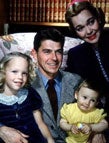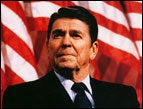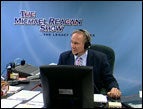
The Truth that Set Michael Reagan Free
The Michael Reagan who is heard on over 200 radio stations coast-to-coast everyday is a force to contend with in the world of conservative politics.
“People forget that before I was Ronald Reagan’s son, I was Jane Wyman’s son,” Michael Reagan tells Scott Ross of The 700 Club. “She was the big deal in the ‘40s and ‘50s. It wasn’t until my dad got into politics and did the Barry Goldwater speech that people said, ‘Oh, that’s Ronald Reagan.’ So I went from being Jane Wyman’s son to Ronald Reagan’s son.”
Michael was the son of Hollywood elite. From all appearances, he led a charmed life. But you know the old saying: appearances can be deceiving. Jane Wyman and Ronald Reagan divorced in 1948. That meant boarding school for six-year-old Michael and his older sister Maureen.
“All of us so-called ‘rich kids’ and ‘lucky kids’ [whose] parents were rich and famous would be dropped off at 7:00 Sunday night and not picked up ‘till two weeks later on a Friday and taken home to be back Sunday night at 7:00,” he says. “If you could stand outside our dorm at Chadwich, you would literally hear us all crying ourselves to sleep at night.”
 Michael was adopted, but his mother had always called him “chosen.” At school, he told another student that he was special.
Michael was adopted, but his mother had always called him “chosen.” At school, he told another student that he was special.
“He comes back to me, ‘You were not chosen; you’re illegitimate,’” he recalls. “So the kids started teasing me in school that I wasn’t a real Reagan. I was the ‘Bastard Reagan,’ the illegitimate Reagan.”
Young Michael didn’t know the meaning of the word, so he looked it up in his mother’s Bible.
He says, “So it took me to . All the illegitimate children and their children until the 10th generation will never enter the kingdom of Heaven. I closed the Bible. This is like 1951. [I] didn’t reopen the Bible until 1978.”
Michael was miserable. When his mother realized that the children needed more time with her, she moved Michael and Maureen to a new school. Because Jane spent so much time filming, Michael and Maureen attended an after-school program.
“It was there I learned to throw a baseball, to throw a football, to trampoline... It was there I was getting affirmation as a little kid. I was being told how wonderful I was, how good I was, that I was loved, that I was cared about. What nobody knew at the time was that I was being set up for sexual abuse by a pedophile.”
A simple yo-yo competition and a winner’s patch convinced eight-year-old Michael to trust a man who in turn destroyed Michael’s innocence.
Michael says, “Now he owned me and started the process of sexually molesting me three days a week for the rest of the year. Even though I knew it was wrong, I couldn’t put my mind to it. Who do I tell? I had no relationship with my parents to be able to tell them. I felt that I was doing something terribly, terribly wrong.”
His abuser was a photographer. What he did next almost destroyed Michael’s life.
“He had three pans of liquid. He’d move the paper from the first pan to the second pan to the third pan. What came up in the third pan was a photograph of the Santa Monica mountains. To this little eight-year-old, it was magic. He said, ‘Would you like to do one of these?’ I said yes, so he gave me the tongs, grabbed my right arm and moved the paper from the first pan to the second pan to the third pan. What came up in the third pan was a nude photograph of me. He put his hand on my right shoulder and said, ‘Wouldn’t your mother like to have a copy?’”
As far as Michael was concerned, his life was over.
“I will never forget that photograph, because it changed my life,” Michael admits. “I knew I had to get away from my mother. I had to get away from God. I thought God had abandoned me, and I knew then I was going to hell. I was going to do everything I could on my own recognizance. I wanted to get there earning my own way.
 “I’m angry. I’m frustrated. People think I should be a success, but I’m afraid of it. I worry, if I become too successful, the photographs will show themselves up. My dad runs for governor, and I hope he’ll run so the love the people have for him will rub off on me. When people see those photographs, people will know that truth about me. They will in fact forgive me for what I’ve done. But the other fear is those photographs will come up and ruin my dad’s political career.”
“I’m angry. I’m frustrated. People think I should be a success, but I’m afraid of it. I worry, if I become too successful, the photographs will show themselves up. My dad runs for governor, and I hope he’ll run so the love the people have for him will rub off on me. When people see those photographs, people will know that truth about me. They will in fact forgive me for what I’ve done. But the other fear is those photographs will come up and ruin my dad’s political career.”
Michael believed he couldn’t tell anyone about the sexual abuse. So he developed other ways of expressing his anger.
“I go out to the garage one morning, and the chain comes off the bike,” he says. “I got a hammer and destroyed the bike, because I thought the bike hated me. That’s what I did to the bike, but in 1965, I had a ‘65 Oldsmobile. I was at my dad’s ranch, went out to start the car, and the battery was dead. I knew the car hated me. The car was an enemy. I got a sledgehammer in that case. It took me 30 minutes to destroy the car... Everything became my molester. My car became my molester."
Michael’s rage affected all his relationships. He says, "If you got too close to me, you became my molester.
“I didn’t know if I was heterosexual or homosexual,” Michael says. “I was fearful saying anything to anybody, because the older you get, the worse it gets. [When I was in high school], I would steal money from my Dad’s wallet on Friday nights, drive to downtown LA and buy prostitutes to prove to myself that I was heterosexual.”
In 1973, Michael went on a blind date with a Christian girl. It changed the course of his life.
“She started praying for me,” he recalls. “Not knowing why, she started praying for me. We get married two years later in 1975. I didn’t tell her a thing. I was afraid that she’d leave.”
In 1978, Michael’s first child, Cameron, came into the world, then Ashley. However, as soon as Cameron approached the age when Michael was molested, old demons came back to haunt.
“I began brow-beating him. I was pushing him down to make him look small so I could look big. I was treating him terribly,” Michael confesses. “He didn’t deserve that.
“Colleen walked in one day and said, ‘What are you doing? I’m getting so tired of you blaming God, cussing God, yelling at God for everything that’s going on in your life. It’s about time you begin asking God for help.’ In 1985, it’s the first time I really said, ‘OK, I’ll ask God for help and see what He does,’ because I was pushing Him away.”
Despite his best efforts to push God away, Michael found that he wasn’t getting much help from anyone else.
“I was going to church, but nobody asked me how I was,” he says. “’How’s your dad?’ ‘ How’s Nancy?’ But nobody said, ‘Michael, how are you?’ They just felt Ronald Reagan was a Christian, you must be too. You’re going to church. Nobody ever asked, and I was sitting there dying. I was looking at the words and not embracing them, because I was going to hell and couldn't tell my wife. I couldn't tell my son that. I couldn't tell anybody that I was going to there and nobody else was. So in '85 finally for the first time, I embrace God, get down on my knees in my bedroom and ask God to give me guidance.”
Michael’s godly wife was his saving grace.
“She’d seen holes in the walls, busted this, busted that for a long time,” he says. “Colleen was the first person I ever got close to and really truly loved. She was the first person who ever held me accountable.”
In 1987, Michael still hadn’t told a soul but money talks.
“I’ve been told I could make two million if I write a tell-all book about my parents, because I’ve been blaming my parents,” he says. “I just began to sit down and write 30 pages. While I was writing the book, God spoke to me. He said, ‘What are you doing? It’s not true. You’re telling a lie.’
“I’ve been living a lie all my life. God said, ‘You’ve got to stop lying. You’ve got to tell the truth.’ I actually broke down. I couldn’t blame my parents anymore and blame God anymore for this. I had to put it behind me but I had to tell.”
Michael told Colleen first. He was sure she’d leave him.
“I told Colleen about [the molester], and I told her what he’d done. Instead of walking away, Colleen embraced me and told me she loved me. Then the moment came, [and] I had to tell my dad and my mother.”
Michael was still concerned that the shocking secret would ruin his father’s political career. He tells The 700 Club, “I wrote about it in my first book. If the story had broken before I broke it, I would have killed myself. That would have been a better option.
“Now here I am at the ranch. Dad’s standing in front of me with his belt buckle on, and it looks like a brand new pair of cowboy boots. Nancy’s on my left side. Nancy and Dad say, ‘So what’s in the book we don’t know about?’ I had to tell Dad, and I couldn’t look at him.
"The hardest thing was telling him the act. It was not enough to tell him, ‘Geez, Dad, I was molested,’ but the act… that was the toughest thing. I got all done. My dad looked at me and said, ‘Where’s this guy? I’ll kick his butt.’ My dad didn’t walk away, didn’t say he hated me. I thought to myself, Why didn’t I do this years ago? But I couldn’t have years ago. God brought me to the right moment in 1987.”
 The pain is still evident, the memories haunting, but Michael can tell his story because he knows the truth.
The pain is still evident, the memories haunting, but Michael can tell his story because he knows the truth.
“That’s why [it’s called] Twice Adopted -- first by my parents then by God. If that didn’t happen, we’re not having this conversation,” Michael says. “I am a free man. You’ll never forget it; it’s a part of your life. It’s an integral part of your life, because your whole life changed because of it. I’ve just compartmentalized it. I can bring it out on occasion, but then I put it back in its compartment.”
Michael is honest with himself that, though he’s put the past behind him, there is still pain.
“There will always be pain, but I think also God has allowed me to show the pain so that, when I give my testimony, it brings other people forward.”




